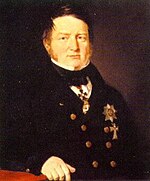Friedrich Georg Wilhelm von Struve
| Friedrich Georg Wilhelm von Struve | |
|---|---|

Friedrich Georg Wilhelm von Struve (1793-1864)
|
|
| Born |
15 April 1793 Altona (today part of Hamburg), Duchy of Holstein |
| Died | 23 November 1864 (aged 71) St Petersburg |
| Citizenship | Danish, Russian |
| Nationality | Baltic German |
| Fields | astronomy |
| Alma mater | Imperial University of Dorpat |
| Notable awards | Royal Medal (1827) |
Friedrich Georg Wilhelm von Struve (Russian: Vasily Yakovlevich Struve, Василий Яковлевич Струве) (15 April 1793 – 23 November 1864 (Julian calendar: November 11)) was a German, Russian astronomer from a famous dynasty.
He was born at Altona, Duchy of Holstein (then a part of the Denmark–Norway kingdoms), the son of Jacob Struve (1755–1841). Struve's father moved the family away from the French occupation to Dorpat in Imperial Russia to avoid military service, equipped with Danish passports.
In 1808 he entered the Imperial University of Dorpat, where he first studied philology, but soon turned his attention to astronomy. From 1813 to 1820, he taught at the university and collected data at the Dorpat Observatory, and in 1820 became a full professor and director of the observatory. His teachings have had strong effect that is still felt in at the university.
Struve was occupied with research on double stars and geodesy in Dorpat until 1839, when he founded and became director of the new Pulkovo Observatory near St Petersburg. Among other honors, he won the Gold Medal of the Royal Astronomical Society in 1826. He was elected a Fellow of the Royal Society in March, 1827 and was awarded their Royal Medal the same year. Struve was elected a member of the Royal Swedish Academy of Sciences in 1833, and a Foreign Honorary Member of the American Academy of Arts and Sciences in 1834. In 1843 he formally adopted Russian nationality. He retired in 1862 due to failing health.
...
Wikipedia
